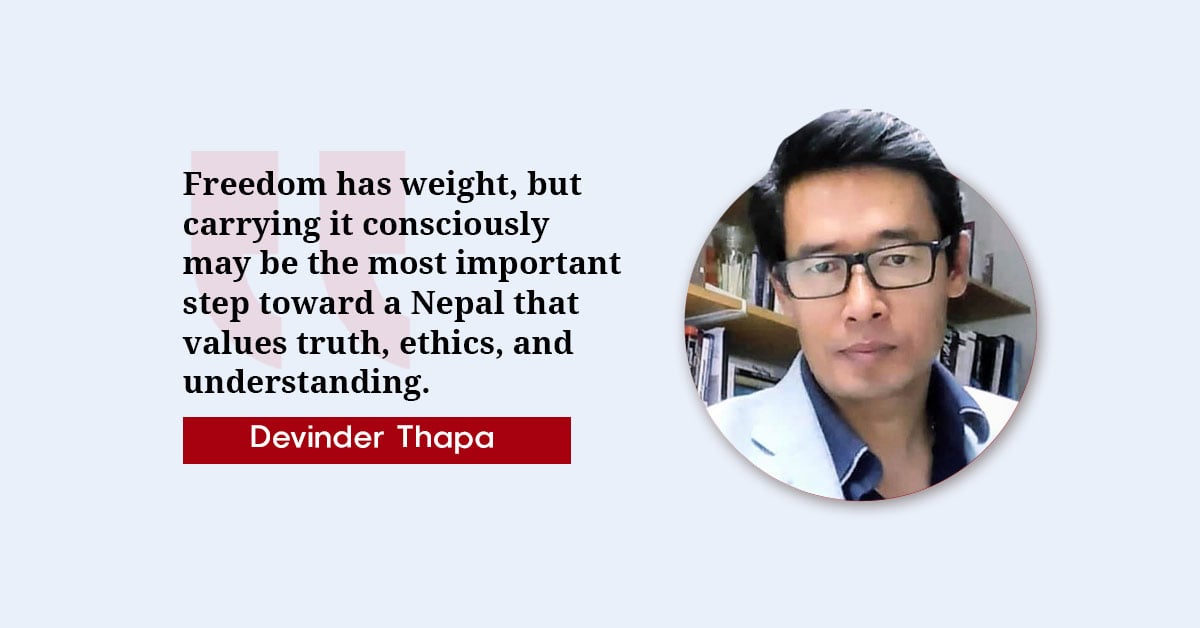

I was listening to a philosophical talk recently, and it made me think: freedom isn’t free. On social media, we feel powerful forwarding messages or sharing videos, but are we really using that freedom responsibly? A question stayed with me: do we truly want the kind of freedom we say we have? At first, it sounded strange. Who wouldn’t want freedom? But the more I thought about it, the more I reflected on what’s happening in Nepal today.
Social media is everywhere, and some political leaders and journalists can influence people almost overnight. A viral WhatsApp message, a sensational YouTube video, or a Facebook post can spread panic, anger, or mistrust in no time.
Freedom, as French philosopher Jean-Paul Sartre said, is not just a gift. It comes with responsibility. On social media, we feel free to share anything, forward anything, and comment on everything. We feel powerful when a post goes viral. But how often do we stop and ask if it is really true? Is it knowledge, or just noise amplified by convenience?
In classical Nepalese and Indian philosophy, knowledge is taken seriously. There are concepts called pramana and premaye. Pramana is a trusted way to know something, knowledge that can be verified through observation, reasoning, or reliable testimony. Forwarding a WhatsApp message, sharing a flashy YouTube video, or trusting a Facebook post with shaky logic does not count as pramana. Premaye is about the intention behind knowledge, whether we seek the truth and share it responsibly, or spread it carelessly. Sharing misinformation, blaming others without checking facts, or stirring fear is not knowledge. It is abusing freedom.
Yet this is what happens too often. Some so-called leaders promise to save Nepal and Nepali, while self-proclaimed journalists treat flimsy evidence as fact. A viral post becomes proof. A video with a few catchy edits becomes the center of heated arguments. Ordinary people get caught in it. They feel scared, angry, or suspicious, and often take sides without checking the facts. This is not just misinformation. It is freedom used carelessly.
Sartre would call this bad faith. We feel free, but in reality, we avoid responsibility. When we share a post or video without checking if it is true, we are escaping responsibility. And in Nepal, where communities are fragile and politics often divides people, these small actions ripple out in ways that are far from small.
Freedom is not doing whatever we want. It is about acting with awareness, knowing that our choices affect others. Classical teachings like Nyaya and Vedantic philosophy give us tools for this.
They teach how to check evidence, think clearly, and act responsibly. Pramana and premaye are not just old ideas; they are very relevant today, especially online, where a single post can reach thousands and influence opinions, reputations, and behavior.
It is striking that some people who talk about Nepal as a Hindu Rashtra and claim to know the Vedas often end up spreading false or misleading information. How can someone claim knowledge of wisdom but ignore its basic rules: check evidence, act responsibly, and have the right intent? This contradiction is part of the problem we see today.
So what can we do? First, think about your own online actions. Ask yourself, am I sharing this to inform, or just to provoke? Am I helping people understand, or just adding to the noise? Second, we should learn how to recognize real evidence and why intent matters. Third, leaders and journalists should remember that influence carries responsibility. Freedom without care can be dangerous.
This is not about silencing yourself. It is about being aware. The strongest voices are not the loudest. They are the ones that speak clearly, carefully, and with respect. True freedom, online or offline, is about making choices that respect both truth and others.
In Nepal today, we are flooded with information, opinions, and claims of evidence. Some are true, some misleading, and some deliberately harmful. A WhatsApp chain claiming corruption spreads like wildfire. A YouTube video edited for drama sparks arguments in Facebook groups. But freedom is not about avoiding responsibility. Pramana and premaye give us a way to act responsibly. Every post we share, every claim we forward, every opinion we voice is a choice. Together, our choices shape the kind of society we are building.
The challenge is this: in a world full of viral messages, sensational videos, and instant outrage, can we use our freedom wisely? Can we treat knowledge not as a weapon, but as a responsibility? Can we stop confusing noise with truth, and instead act with care and thought? Freedom has weight, but carrying it consciously may be the most important step toward a Nepal that values truth, ethics, and understanding.